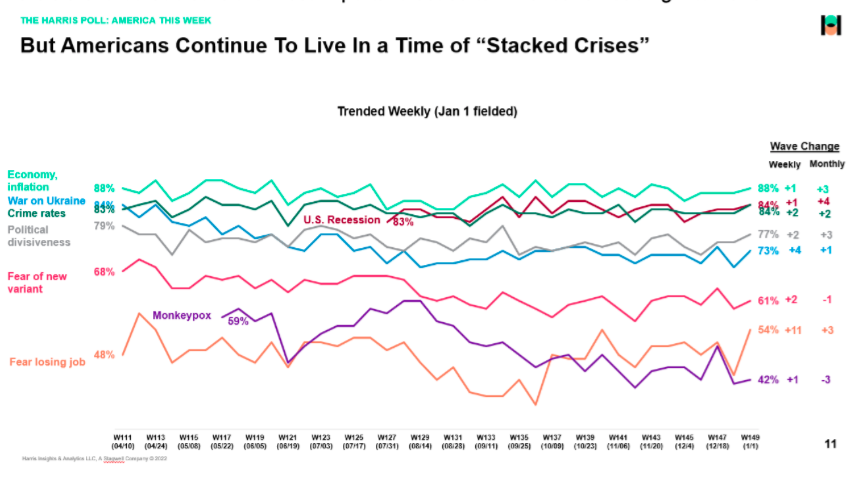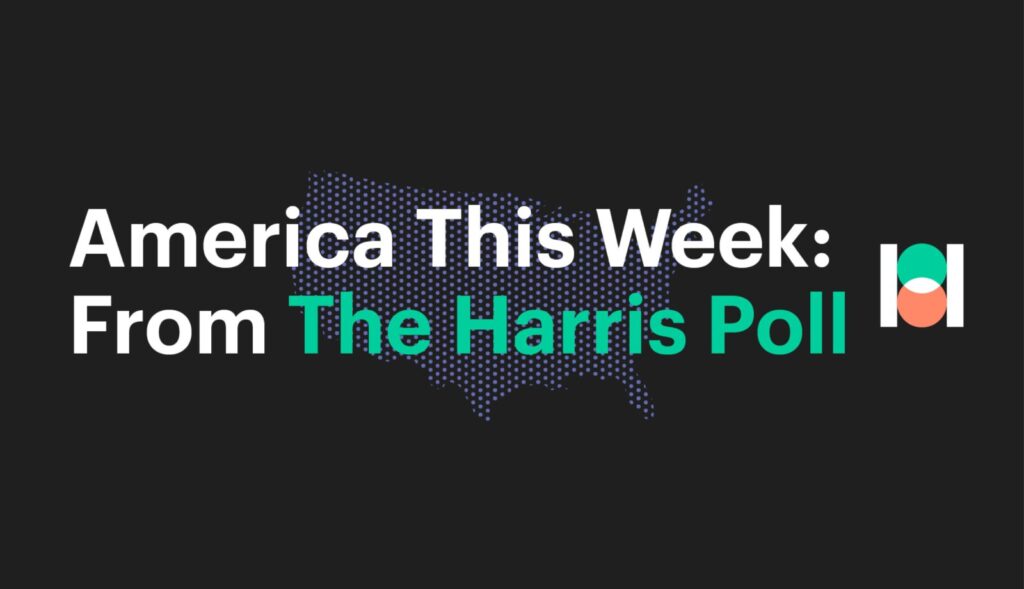Brief • 4 min Read
The latest trends in culture and society from The Harris Poll
The Harris Poll, America This Week survey fielded from December 29th to January 1st among 1,999 U.S. adults found that economic concerns have not abated despite the egg nog: Nearly nine in ten Americans (88%) are still concerned about the economy and inflation (+1%-pt from last week), and three-quarters about affording their living expenses (75%, +5%-pts). Most notably, Americans’ fear of losing their jobs shot up 11%-pts to (54%).
Here’s a chart that distills the most important issues to Americans heading into 2023:

Lastly, check out the latest America This Week monthly summary slide deck and tabs for more insights into inflation and worker sentiment Download the November report here.
71 Favorite Facts of 2022: New York Times-Harris Poll
We at The Harris Poll were happy to find our data chosen among the New York Times’ “71 of Our Favorite Facts of 2022.”
- Our contribution is #63: We found that nearly half of all millennials have tattoos, compared with less than a fifth of Boomers (13%).
- Additional favorited facts: #47. Humans spend about 35 minutes a day chewing; chimpanzees chew for about 4.5 hours a day, and orangutans for about 6.6 hours.
- Also, #55. A 2020 study found that up to 30 million workers had the skills to move to new jobs that paid, on average, (70%) more than their jobs at the time.
Takeaway: However, what we found recently is that it turns out that nearly half of those with tattoos (45%), almost 60 million Americans, have regrets about them and have had a tattoo removed or will soon. As for what then to consider in 2023…ink wisely, friends.
Voters Look Ahead: Harvard CAPS-Harris Poll
As we begin the New Year, our Harris Poll Chairmen (and Stagwell Chairman/CEO) Mark Penn lays out an interesting analysis in the latest December Harvard CAPS-Harris Poll. (Download the full report and listen to Mark/The Hill’s Bob Cusack podcast).
- Looking ahead, Americans think increasing inflation will linger: Two-thirds of U.S. voters (66%) think inflation is still increasing, and 6 in 10 (61%) think inflation will continue for at least another year.
- However, voters are split on whether the Biden administration is to blame for inflation (51%) or has been caused by factors beyond their control (49%).
- But Americans see economic troubles easing slightly: The percentage of voters who think the economy is heading on the right track (31%) and who are optimistic about their lives over the next year (44%) both increased by (3%-pts).
- And, while inflation remains the number one most important issue facing the country today (35%), it’s down (4%-pts) from November, followed by the economy and jobs (27%) and immigration (24%).
Takeaway: Despite the economic malaise in these numbers, we have been steadily increasing our economic optimism. Nearly a third of Americans say the economy is on the right track (31% +10%-pts from June). And more than a quarter now say, “My financial situation is improving” (26%; also +10%-pts from June). So while uncertainty lingers over a coming recession – (41%) think we’re in one now; (39%) believe we will be – six straight months of improving economic numbers are hopeful heading into the new year.
Americans Turn to Side Hustles: American Staffing Association-Harris Poll
Facing inflation and economic uncertainty, U.S. workers are turning to side hustles to shore up their finances, according to our latest survey with American Staffing Association as covered by HR Dive.
- Nearly 6 in 10 Americans (58%) are debating getting a second job in the next year, with younger Americans being the most likely to (Gen Z: 72%, Millennials: 67% v. Boomers: 30%).
- Over 6 in 10 employees (62%) report having witnessed employers taking cost-cutting measures or heard employers talking about a potential expression in the past three months.
- Not a new trend: A survey found by Lending Tree found that close to half of Americans (44%) already have a side hustle, an increase from (13%) in 2020 – where (71%) of those with a second job say they don’t think they could cover all their expenses without the extra income.
Takeaway: “The effects of a recession are hitting workers across business sectors, including tech and social media companies, e-commerce, and real estate,” Richard Wahlquist, President and CEO at the American Staffing Association, said in a news release. “As employers focus on reducing expenses and belt-tightening, workers are considering turning to second jobs or extra shifts to make ends meet.”
The Doctor Will Ignore You Now: MITRE-Harris Poll
In our latest survey in partnership with MITRE, as featured in Becker’s Hospital Review, a worrying trend appears in the number of patients, especially among BIPOC and those with disabilities, feeling ignored by healthcare professionals.
- Over half of patients (52%) feel their symptoms are “ignored, dismissed, or not believed” when seeking medical treatment. That number rises to 6 in 10 among disabled (63% v. non-disabled: 44%) and Hispanic patients (62% v. white: 49%).
- Additionally, over half of disabled, Black, and Hispanic patients report feeling their healthcare provider is “biased against me based on their attitude, words, or actions” (55%, 52%, 51% v. non-disabled: 34%, white: 38%).
- And while half of the patients (50%) report their healthcare provider “assumes something about me without asking,” it increases to (60%) of disabled patients (v. non-disabled: 42%) and (56%) of Hispanic patients (v. white: 47%).
Takeaway: “These findings confirm unacceptable disparities in patient experience along racial and ethnic lines, and for those who are managing chronic health conditions or navigating the world with disabilities,” said Juliette Forstenzer Espinosa, senior Medicare, Medicaid, and Affordable Care Act Marketplace strategist, MITRE. “And these categories are, of course, intersectional. There’s no question there is work better to serve all populations at the point of care.”
Subscribe for more Insights
Subscribe to our newsletter for the latest trends in business, politics, culture, and more.
Download the Data
This survey was conducted online within the U.S. by The Harris Poll from December 29th to January 1st, among a nationally representative sample of 1,999 U.S. adults.
Download
Subscribe for more Insights
Subscribe to our newsletter for the latest trends in business, politics, culture, and more.
Download the Data
This survey was conducted online within the U.S. by The Harris Poll from December 29th to January 1st, among a nationally representative sample of 1,999 U.S. adults.
DownloadRelated Content








